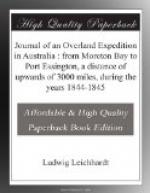We have commenced to carry with us not only our quart pots, but also our two gallon pot full of water.
August 29.—We travelled to lat. 16 degrees 58 minutes 27 seconds long. 138 degrees 25 minutes; a distance of about eight miles N.N.W. and N.W. over a more open country, with occasional patches of thick scrub. We crossed several watercourses and creeks; and came to a small river which flowed to the N. by E. and which I called the “Marlow,” after Capt. Marlow of the Royal Engineers, who had kindly assisted me in the outfit of my expedition. We went down the river about two or three miles, and came to a plentiful supply of water, which was indicated, a long time before we arrived at it, by the call of the red-breasted cockatoos, noticed a few days since; but which was probably only a variety of the common species.
A low shrubby Acacia with sigmoid phyllodia was frequent on the hills. A little fly-catcher (Givagone brevirostris?) charmed us with its pretty note at our last camps. Bronze-winged pigeons were very numerous, and I saw a pair of Geophaps plumifera rising from under a shady rock, as I was riding down a rocky creek. Two black ducks and three cockatoos were shot; the long reaches of water down the river were covered with water-fowl, and Charley and Brown were so desirous of procuring some messes of black ducks, that they did their best to persuade me to stop; but, being anxious to escape from this scrubby country, I did not yield to their solicitations.
The crops of the large cockatoos were filled with the young red shoots of the Haemodorum, which were almost as pungent as chillis, but more aromatic; the plant abounded on the sandy soil. The small cockatoo of the plains, which we saw again in great numbers, seems to feed on a white root and on the honey of the whole seed-vessel, or the flower-bud, of the drooping tea-tree.
The first part of the night was clear, but it became foggy and cloudy after midnight. In the morning, the dew was dropping from the trees, but the grass and our things were not at all wet.
August 30.—We travelled about ten miles N. 60 degrees W. over a scrubby though a little more open country, full of enormous massive ant-hills, surpassing even those of Big Ant-Hill Creek, in height and circumference, and came, at the distance of eight miles from our camp, to a low scrub on sandy soil with shallow watercourses. Salicornia grew in abundance; and emu tracks were very frequent. Coming on a broad foot-path of the natives, I followed it to the south-west, and came to some fine fresh water-holes in the bed of a creek, surrounded by high drooping tea trees, which were in blossom and covered with swarms of white cockatoos. These water-holes were in lat. 16 degrees 55 degrees, and situated to the south-west of some low scrubby hills. We encamped in a grove of Pandanus. The natives had just left, and the tea-tree bark was still smoking from the fire which had spread from their camp.




